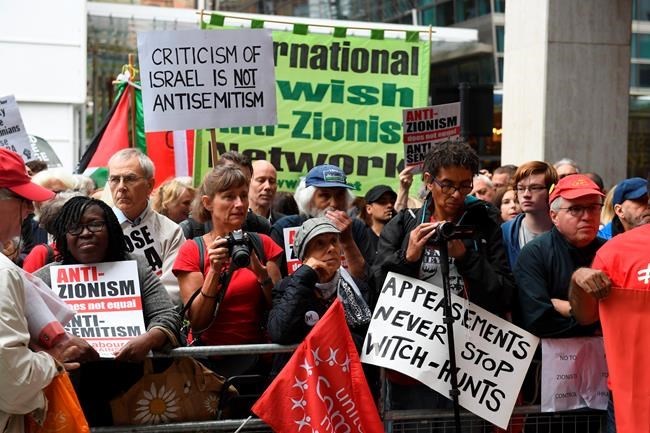
Activists react outside a meeting of the Labour National Executive Committee in London Tuesday Sept. 4, 2018 which is expected to decide on whether to adopt the International Holocaust Remembrance Alliance (IHRA) definition of anti-Semitism and its examples, which has been the subject of a bitter row within the party over recent months. (Stefan Rousseau/PA via AP)
Republished September 04, 2018 - 10:14 AM
Original Publication Date September 04, 2018 - 3:31 AM
LONDON - Britain's main opposition Labour Party on Tuesday adopted an internationally recognized definition of anti-Semitism, an about-face aimed at defusing a crisis that has alarmed U.K. Jews and divided party ranks.
After a meeting lasting several hours, Labour's National Executive Committee backed a definition approved by the International Holocaust Remembrance Alliance.
Earlier this year, the party adopted a more limited definition, omitting some of the alliance's language around criticism of Israel. The alliance's definition, for example, says it is anti-Semitic to compare contemporary Israeli policies to the policies of the Nazis. The original Labour definition left that out, but it has now been included.
Labour's reluctance to adopt the entire definition renewed claims that the left-of-centre party has become hostile to Jews under leader Jeremy Corbyn, a longtime supporter of the Palestinians.
Corbyn has insisted that anti-Semitism has no place in the Labour Party, but some members accuse him of failing to stamp out anti-Jewish prejudice. Last week, veteran lawmaker Frank Field quit Labour's grouping in Parliament, saying the party had become a "force for anti-Semitism."
Corbyn has been accused of failing to expel party members who express anti-Semitic views and has received personal criticism for past statements, including a 2010 speech in which he compared Israel's blockade of Gaza to Nazi Germany's sieges of Leningrad and Stalingrad during World War II.
Critics have also condemned him for attending a 2014 wreath-laying to Palestinians whom Israel has linked to the murder of 11 Israelis at the 1972 Munich Olympics.
Corbyn supporters accuse political opponents and right-wing media outlets of misrepresenting the leader's views. Some also say accepting the alliance definition could quash legitimate criticism of Israel.
Labour said Tuesday that it had adopted the alliance definition, including its examples of anti-Semitism, "alongside a statement which ensures this will not in any way undermine freedom of expression on Israel or the rights of Palestinians."
Emotions ran high outside Tuesday's meeting, where rival groups of demonstrators shouted chants for and against Corbyn. Anti-Corbyn protesters held signs altering the party's slogan "For the many, not the few" to "Labour: For the many, not the Jew." The opposing group insisted that "Anti-Zionism is not anti-Semitism."
The European Jewish Council "cautiously" welcomed Labour's change of policy but said it was "deeply regrettable" it had taken so long.
Labour's deputy leader, Tom Watson, said he hoped "today is the start of a new conversation with the Jewish community in Britain."
"It starts by adopting the full definition and we can go out and reassure people and work in partnership with the Jewish community to tackle anti-Semitism very, very quickly and very, very decisively, and make the bigger case that Jewish people are welcome in the democracy of the Labour Party," he told the BBC.
News from © The Associated Press, 2018